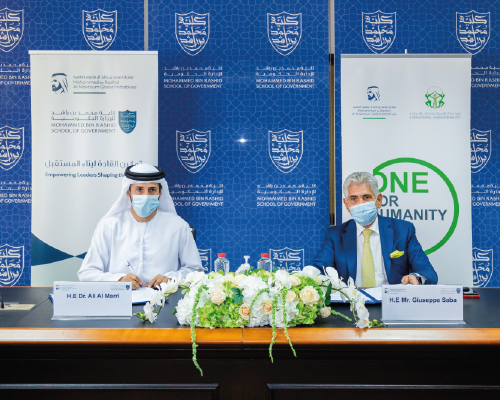
The Mohammed bin Rashid School of Government (MBRSG) has signed a Memorandum of Understanding with Dubai-based global hub for humanitarian emergency preparedness and response International Humanitarian City (IHC) – the largest humanitarian hub in the world.
The agreement was signed at the MBRSG headquarters by His Excellency Dr. Ali bin Sebaa Al Marri, Executive President of MBRSG, and IHC’s Chief Executive Officer Mr. Giuseppe Saba.
“The Mohammed bin Rashid School of Government has firmly established its reputation as the leading institution focusing on governance and public policy in the Arab world,” said H.E. Dr. Ali bin Sebaa Al Marri. “This is our core mission, and we have set out to accomplish it through a series of courses and programmes to train, educate, and empower the leaders of tomorrow. But it is also an ambition we seek to fulfil by weaving an extended network of partnerships with renowned organisations that have amassed extensive expertise and insight in their respective fields of operation.”
“We are thrilled to be signing this MoU with the International Humanitarian City,” H.E. Al Marri added. “Our advanced capacities and well-established programmes will be more accessible to IHC members, and we look forward to training the humanitarian leaders of tomorrow and to the many collaborations we will have with the IHC, which has quickly grown into a significant community of institutions dedicated to social development and providing assistance to those who need it.”
Mr Giuseppe Saba, CEO of the International Humanitarian City in Dubai said: “The signing of the memorandum of understanding with The Mohammed bin Rashid School of Government (MBRSG) is a major milestone for us”.
He explained “We are looking into forming fruitful partnerships especially with the academic institutions, because we are certain of the value, they can provide to the humanitarian community”.
He finally added: “This type of partnerships can create furthermore opportunities for young students to accede to humanitarian studies and embrace humanitarian work. Our organisations are both acting under the same umbrella of the Mohamed Bin Rashid Global Initiatives (MBRSGI), and this agreement is going to further reinforce our partnership”
The MoU sets a framework for the two parties to exchange faculty members and students for lectures, seminars, discussions, and cultural activities, where they can coordinate and organise additional field trips for students and faculty in the future. It also lays the groundwork for research collaboration between the two parties, which involves sharing research, grants, and resources, as well as endorsing staff, researchers, and faculty members to produce research outputs in various fields, including public policy, global development, governance, innovation management, and sustainable development, among many others.
Furthermore, the agreement allows potential students to participate in producing research outputs with researchers and academics from both entities, opening up areas for dissertation study for interested students. It will also see the two parties collaborate on hosting and organising events, such as academic conferences, forums, site visits, seminars, and symposiums.
Also under areas of cooperation are Executive Education Programmes, where the two parties would collaborate to develop joint courses on each other’s premises. MBRSG boasts extensive expertise with a well-established executive education department delivering a wide scope of short courses and diplomas in this area. This, in turn, “sets the stage for further collaborations in the future, from establishing a program for humanitarian health logistics to working on a joint book project”, said Dr. Immanuel Azaad Moonesar, Associate Professor- Health Administration and Policy, MBRSG.
Last but not least, the MoU outlines a roadmap for MBRSG and IHC to collaborate on two projects: the Humanitarian Logistics Databank and the Centre of Excellence. This collaboration would cover different areas, including research, documenting best practices and case studies, co-designing policies to regulate health activities’ operational and logistical side, and augmenting humanitarian building capacity through training and exploring general or health-related topics.